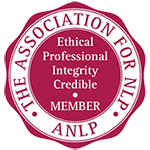Choosing the right training is important.
It bothers me that so many people choose their NLP training with little research. As if there isn’t much difference between them. The fact is NLP courses vary hugely in content and delivery. A little research will help you make the right choice and find a training that will offer value for many years after you have completed the course
NLP Intro or Diploma
This isn’t a recognised qualification. Usually a two day course – can be useful as a taster – a way of deciding if you want to explore NLP further or a way to check out the Trainer and decide if you want to go on to do the Practitioner training.
Will give you some NLP tools that you can use for yourself or with friends/colleagues/family.
Practitioner Training
This can be the entry level training for many so it often turns out to be a randomly picked course – either the closest in proximity or the most convenient course dates.
Pretty much all practitioner trainings are interesting and enjoyable and good fun. That doesn’t mean that you will learn the skills to be a competent practitioner. So when you ask people how they found the training, you want to be listening for what they got out of it as well as how much they enjoyed it.
Especially ask how they now use the skills they learned (the real measure of any training is how it is used in practice).
A really good practitioner training will be enjoyable and fun to do but will also offer you much more than that; a greater understanding of yourself, an opportunity to sort out issues and difficulties in your life, the ability to set robust smart goals and much more. I always think that the sign of a really great practitioner training is visible in the participants on completing the course. You don’t have to be highly trained to spot it. Someone who has completed a really great Practitioner Training will simply be smiling wider and smiling more often.
In the days weeks and months after the training you will notice that the smiling more hasn’t seemed to wear off and that the person now embraces opportunities which before the training they would have been more likely to run from.
On completing a good practitioner training a person should be happier, more resilient and more open to possibilities than they were before. In addition they will have learnt to be a highly effective listener, plus have a great set of helpful tools for increasing flexibility of thinking in others.
Points to Remember
- Do your research and find out what’s available
- Be prepared to travel for the right training
- Ask for recommendations from friends and colleagues
- Find out how those friends and colleagues now use their NLP
Things to ask the facilitator
- Ask to speak to past participants. Ask them how they use what they learned.
- Check how many hours of teaching you will receive. To calculate, ask for start and end times of days and then subtract an hour and half to account for breaks.
- Ask about qualifications and experience of trainer and any guest presenters.
- Ask about the course manual – is it bespoke or a generic manual?
- Are there course audios – are they bespoke or generic and how many hours of audios are included?
- Ask about certification – what will you get, who recognises the qualification and will it qualify you for professional indemnity insurance?
- Ask about ongoing support after the course.
- Ask about ongoing learning opportunities – is there a cost to assisting, will you able to assist after completing Practitioner or will you be expected to complete Master Practitioner before being allowed to assist?






